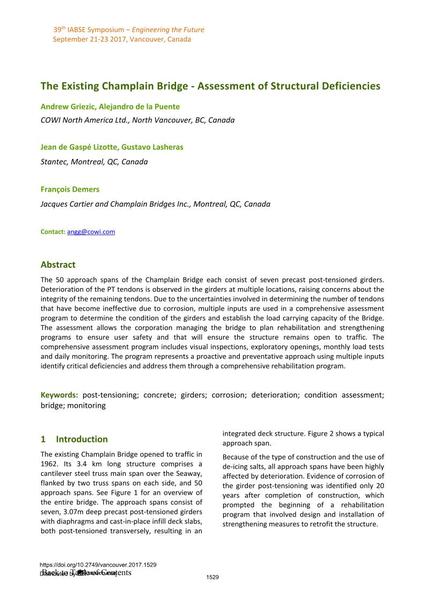The Existing Champlain Bridge - Assessment of Structural Deficiencies

|
|
|||||||||||
Détails bibliographiques
| Auteur(s): |
Andrew Griezic
(COWI North America Ltd., North Vancouver, BC, Canada)
Alejandro de la Puente (COWI North America Ltd., North Vancouver, BC, Canada) Jean de Gaspé Lizotte (Stantec, Montreal, QC, Canada) Gustavo Lasheras (Stantec, Montreal, QC, Canada) Francois Demers (Jacques Cartier and Champlain Bridges Inc., Montreal, QC, Canada) |
||||
|---|---|---|---|---|---|
| Médium: | papier de conférence | ||||
| Langue(s): | anglais | ||||
| Conférence: | IABSE Symposium: Engineering the Future, Vancouver, Canada, 21-23 September 2017 | ||||
| Publié dans: | IABSE Symposium Vancouver 2017 | ||||
|
|||||
| Page(s): | 1529-1536 | ||||
| Nombre total de pages (du PDF): | 8 | ||||
| Année: | 2017 | ||||
| DOI: | 10.2749/vancouver.2017.1529 | ||||
| Abstrait: |
The 50 approach spans of the Champlain Bridge each consist of seven precast post-tensioned girders. Deterioration of the PT tendons is observed in the girders at multiple locations, raising concerns about the integrity of the remaining tendons. Due to the uncertainties involved in determining the number of tendons that have become ineffective due to corrosion, multiple inputs are used in a comprehensive assessment program to determine the condition of the girders and establish the load carrying capacity of the Bridge. The assessment allows the corporation managing the bridge to plan rehabilitation and strengthening programs to ensure user safety and that will ensure the structure remains open to traffic. The comprehensive assessment program includes visual inspections, exploratory openings, monthly load tests and daily monitoring. The program represents a proactive and preventative approach using multiple inputs identify critical deficiencies and address them through a comprehensive rehabilitation program. |
||||
| Mots-clé: |
béton pont
|
||||
